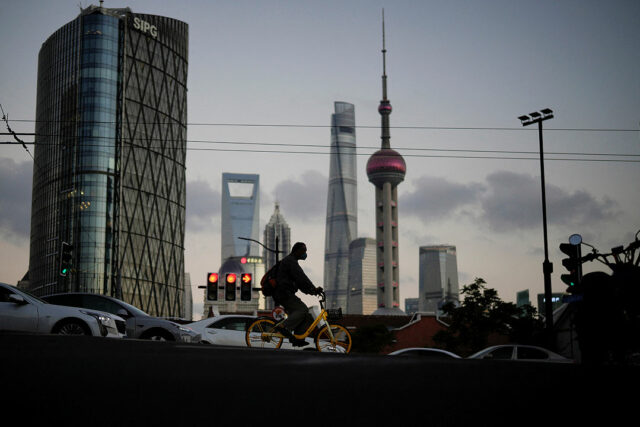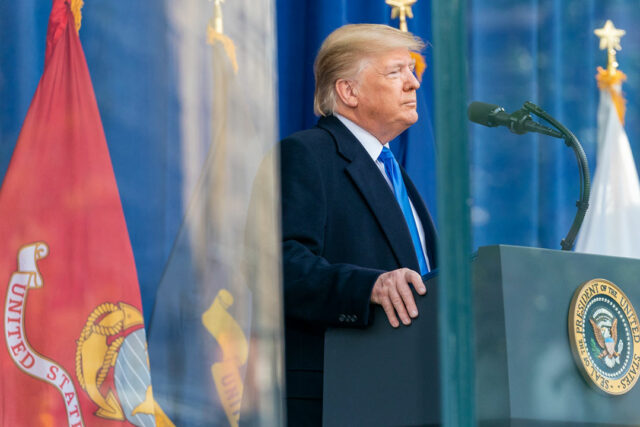BEIJING — China’s economic growth slowed to the weakest pace in a year in the third quarter as fragile domestic demand left it heavily reliant on manufacturing production and exports, stoking concerns about deepening structural imbalances.
The economy’s overreliance on exports at a time of mounting trade tensions with Washington is also raising questions over whether Beijing has the resolve to tackle critical policy challenges to foster longer term sustainable growth.
These concerns remain on the forefront of China’s policy deliberations even as Monday’s gross domestic product (GDP) figures showed forecast-matching growth of 4.8% in the third quarter, keeping the economy on track to expand by roughly 5% this year, potentially with the help of more stimulus.
“With China on track to hit this year’s growth target, we could see less policy urgency,” said Lynn Song, chief economist, Greater China at ING.
“But weak confidence translating to soft consumption, investment, and a worsening property price downturn still need to be addressed.”
Beijing may be using the headline resilience in growth as a show of strength in upcoming talks between its vice premier He Lifeng and Treasury Secretary Scott Bessent in Malaysia this week and a potential meeting between presidents Donald J. Trump and Xi Jinping in South Korea later.
The recent export data also highlights China’s ability to diversify away from the US market, the world’s largest consumer economy. Its US export sales were down 27% year on year last month, but shipments to the European Union, Southeast Asia and Africa grew by 14%, 15.6% and 56.4%, respectively.
Still, the sluggish domestic market remains a drag for businesses with Monday’s data showing retail sales slowing to a 10-month low.
The third-quarter gross domestic product growth lagged the 5.2% pace in the second quarter but was in line with a Reuters poll forecast for a rise of 4.8%.
The economy grew 5.2% year on year in January-September, the National Bureau of Statistics data showed, suggesting growth is on track to hit the government’s annual target of around 5%.
On a quarterly basis, GDP grew 1.1% in the third quarter, compared with a forecast 0.8% increase and a revised 1% gain in the previous quarter.
TRADE RIFT HIGHLIGHTS WEAKNESS IN LOPSIDED ECONOMY
Renewed trade tensions with Washington have highlighted the vulnerabilities of China’s lopsided economy, raising expectations that Chinese leaders may embrace painful changes to rebalance growth towards domestic consumption.
While China’s export growth rebounded in September, much of the recent data show the world’s second-largest economy has lost momentum, and deflationary pressures have persisted despite efforts to curb overcapacity and fierce competition.
Moreover, manufacturers’ sales abroad to non-US countries come at the cost of profitability due to intense competition on price, making it hard to sustain unless trade tensions tone down.
Jeremy Fang, a sales officer at a Chinese aluminum products maker, says his firm lost 20% of revenue as higher sales in Latin America, Africa, Southeast Asia, Turkey and the Middle East failed to fully offset an 80%-90% order plunge in the US.
Mr. Fang said he is learning Spanish to get ahead of his Chinese competitors rushing to non-US markets and is now travelling abroad twice more often than he did last year.
But that extra effort isn’t enough.
“You have to be ruthlessly competitive on price,” Mr. Fang said. “If your price is $100 and the customer starts bargaining, it’s better to drop $10-$20 and take the order. You can’t hesitate.”
Mr. Trump has threatened to raise tariffs on Chinese goods by an additional 100% starting Nov. 1. However, US officials have signaled that both countries are prepared to lower the temperature in their tariff spat.
CHINA’S FIVE-YEAR PLAN IN FOCUS
Chinese leaders will hold a closed-door meeting from Monday through to Thursday to discuss, among other things, the country’s 15th five-year development plan, which is expected to prioritize high-tech manufacturing in the wake of the intensifying rivalry with the United States.
Investors are also looking to a Politburo meeting and the Central Economic Work Conference, expected in December, for clues on economic policy for next year.
The prolonged crisis in the property market, with latest figures showing investment in the sector down 13.9% in the first three quarters year-on-year, has weighed heavily on growth and consumer confidence in China.
Authorities have unveiled modest stimulus measures this year, and while there is room for additional support, analysts are divided over whether policymakers will act this year.
“I don’t think there will be additional consumption-focused stimulus. The focus of policy is long-term, including pension reform, which will improve consumption in the future, but will reduce it more immediately due to layoffs and people having less cash in hand,” Dan Wang, China director at Eurasia Group.
Separate September data, which were also released on Monday, showed industrial output grew to a three-month high of 6.5% year on year, accelerating from 5.2% growth in August and beating a forecast of 5%.
Retail sales rose 3% in September, the slowest pace in 10 months, from 3.4% in August and matching a forecast 3% rise.
Fixed-asset investment shrank 0.5% in January-September from a year earlier, reversing a 0.5% rise in the first eight months for its first contraction since the pandemic. — Reuters












